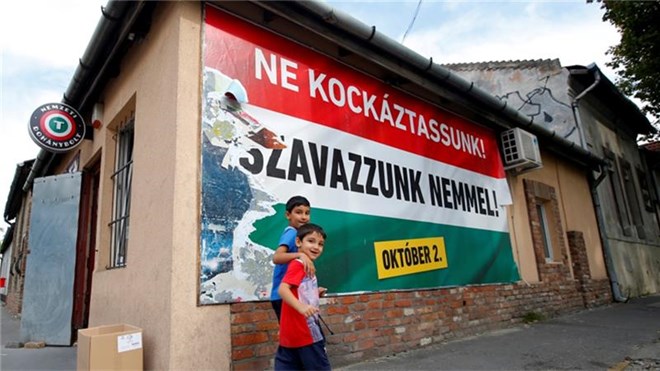
Sunday October 2, 2016

Right-wing government opposes EU resettlement plan, but rights groups accuse PM Orban of stoking fears and xenophobia.
Hungarians on Sunday began voting on a referendum over European Union plans to relocate refugees and migrants among member states.
The right-wing government of Prime Minister Viktor Orban has fiercely opposed the EU plan, which seeks to share 160,000 asylum seekers around the 28-member bloc via mandatory quotas. Hungary has not accepted a single person allocated under the scheme.
In the run-up to the vote, opinion polls showed vast support for a rejection of the EU proposal among those who said they would vote. They also suggested, however, that turnout might not necessarily top the 50 percent required for the poll to be valid.
In an opinion piece published on Saturday, Orban said Hungarians had "a duty" to help his government fight the failed "liberal methods" of the "Brussels elite".
"Mass migration without control means a real threat. It endangers the peaceful and safe European way of life," he wrote in the Magyar Idok newspaper.
Voting begins at 04:00 GMT and closes at 17:00 GMT. Preliminary results are expected after 18:00 GMT.
The question put to Hungarians is: "Do you want the European Union to be able to mandate the obligatory resettlement of non-Hungarian citizens into Hungary even without the approval of the National Assembly?"
Xenophobia boost
The deal in question, spearheaded by Germany and approved by most EU countries last year, is aimed at easing pressure on Greece and Italy, the main refugee entry points into the bloc for hundreds of thousands of refugees mostly fleeing war in Syria.
But some eastern and central European nations have vehemently opposed to the plan, with Hungary joining Slovakia in filing a legal challenge against it.
About 400,000 migrants and refugees passed through Hungary in 2015 before the government sealed off the southern borders with razor wire and fences in the autumn.
The announcement of the referendum in July by Orban's government has been followed by an increase in xenophobic feelings, according to polls.
In the run-up to the vote, the government led a huge media offensive urging the eight-million-strong electorate to reject the EU plan, drawing a direct link between migration and attacks in EU countries.
A survey conducted in August by the Publicus Institute for the Vasarnapi Hirek newspaper found 35 percent of the 1,000 people asked said it was obligatory to help refugees, down from 64 percent in September 2015.
Government critics say Hungary has been heavy-handed in its answer to the refugee crisis. Luxembourg Foreign Minister Jean Asselborn said Hungary should be expelled from the bloc for breaching European values, including erecting a razor-wire fence along its border with Serbia.
On Friday, opposition parties and rights groups demonstrated in the capital Budapest against the referendum, criticising the government for stoking fears and xenophobia.
Earlier this week, Amnesty International also accused Hungary's government of mistreating refugees and migrants on the Serbian border.
Asylum-seekers, including unaccompanied children, are suffering "violent abuse, illegal push-backs and unlawful detention at the hands of Hungary’s authorities, and a system blatantly designed to deter them" from crossing into the EU, Amnesty said in a report on Tuesday.
Muslims in Hungary also said they were wary of the government's referendum.
"I'm starting to feel that my own homeland is repudiating me," Timea Nagy, a Hungarian Muslim, told The Associated Press news agency.
Some 5,600 Muslims live in Hungary, according to the 2011 census, the latest available.
"We could say that this [referendum] campaign is against the migrants but in reality it is covertly against Islam, that's how people mostly understood it," Tayseer Saleh, imam of the Darusallam Mosque, told AP.
"We do not support the migrants coming to Europe," Saleh said. "We support putting an end to the problems there and I guarantee that 90 percent of the people will return to their homeland."
'Rule of fear'
Orban has long had a testy relationship with Brussels, with critics saying his shake-up of Hungarian institutions from 2010 has undermined democracy.
However, his stance during Europe's refugee crisis has caused particular anger.
"Prime Minister Orban has replaced the rule of law with the rule of fear," said John Dalhuisen, Amnesty's director for Europe.
"His attempts to deliberately prevent refugees and migrants from reaching Hungary have been accompanied by an ever more disturbing pattern of attacks on them and the international safeguards designed to protect them."
But Orban's anti-migrant rhetoric has gone down well with many Hungarians at home, cementing his party's lead over the opposition.
"We must preserve our Hungarian national character here in the middle of Europe and all the other European states should also preserve their national characters," Budapest resident Judit Hegyi told Reuters news agency in the run-up to the vote.
But others raised their voice against government propaganda, which they say vilifies refugees and incites hatred.
"We came here so that we would be less ashamed of ourselves on Sunday night," teacher Zsuzsa Berkesi told Reuters.
"I expect the worse: that it will be valid, with more than 50 percent of people voting, and this makes me sick."